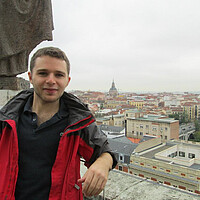Why is Stephen Colbert ranting about a 'poor door'?
Loading...
After a New York luxury condominium developer won zoning approval to build a Dickensian “poor door” entrance last week, pundits and politicians decried the move as the latest symbol of America's growing class divide.
The 33-story Upper West Side complex would provide a front entrance for waterfront condo buyers and a back door for street-side, rent-controlled tenants. To be eligible for an affordable apartment, a resident would need to earn less than 60 percent of the neighborhood’s median household income, stated the American Planning Association, or $51,140 a year, twice the federal poverty line for a family of four.
Stephen Colbert, host of Comedy Central's 'The Colbert Report,' satirized the proposal on Monday night, saying that the separate entrances are part of a larger trend.
Now, poor doors are just the latest in a trend that helps us haves not have to see the have-nots. I mean, we haves get skyboxes instead of bleachers, personal shoppers instead of going to a store, and at airports, first class has its own TSA lane. (Pat Down With Full Release.)
I mean, even the Happiest Place on Earth is happier for us, because we can pay up to an extra $500 an hour to skip to the front of lines at Disney World.
Ironically, the ‘poor door’ arose from progressive activists embracing the idea of inclusionary zoning, or giving developers the right to build more high-end housing on the condition that they include affordable units, says editor of the Left Business Observer, Doug Henwood.
“It’s supposed to be some sort of measure to flatten the inequality in housing availability in the city,” said Mr. Henwood, adding “if this model is followed elsewhere, it looks like a grotesque visible marker of increasing class division.
The segregated entrance may be just the latest example of the growing gap between the rich and poor in the United States. Income inequality has risen steadily since the 1970s, approaching levels not seen since before the Great Depression, according to Emmanuel Saez, professor of economics at UC-Berkeley.
In the last era with ‘poor doors’ – the Gilded Age in 1928 – the wealthiest 1 percent of households made 23.9 percent of pretax income, with the bottom 90 percent taking home 50.7 percent, stated the Pew Research Center. By the middle of World War II that gap had narrowed, with the rich receiving 11.3 percent while the poorer 90 percent earned 67.5 percent.
Starting in the 1970s, higher-income brackets earned more of the nation’s income while less affluent Americans took home less of the economic pie – in 2012, the top 1 percent made 22.5 percent, while the bottom received 49.6 percent of the nation’s pretax income.
While Stephan Colbert's 'poor door' rant raises the profile of America's income inequality gap, many dispute why it’s happening. Liberal observers blame globalization and government deregulation while conservatives point to technological innovation and rewarding entrepreneurial talent.
Some of the world's top capitalists have weighed in on the issue, questioning whether the gap is healthy for the US economy. As The Christian Science Monitor recently reported:
For many economists, a shrinking middle class, as well as low employment, has profound implications. A majority of economists polled by The Associated Press in mid-December said they worry that with most stock market gains flowing upward to the top 10 percent of Americans, the consumer spending base has become too narrow. They also said that a middle class with more cash to spend would be able to stimulate a broad-based climate of economic growth and job creation better than a smaller, über-rich base could.
"For the past 10, 20, 30 years, capital has moved away from labor and towards corporations and investors," says Bill Gross, the founder and co-chief investment officer of PIMCO in Newport Beach, Calif.. "I'm not sure capitalism can thrive in a system in which ... [labor] has a declining interest, in terms of percentage of the pie. Then ultimately the pie itself can't grow, because consumption can't be supported."
Of course, New York City has long had another symbol of wealth: the doorman. What Colbert didn't mention was whether the 'poor door' residents of the Upper West Side complex would get their own doorman or not.








